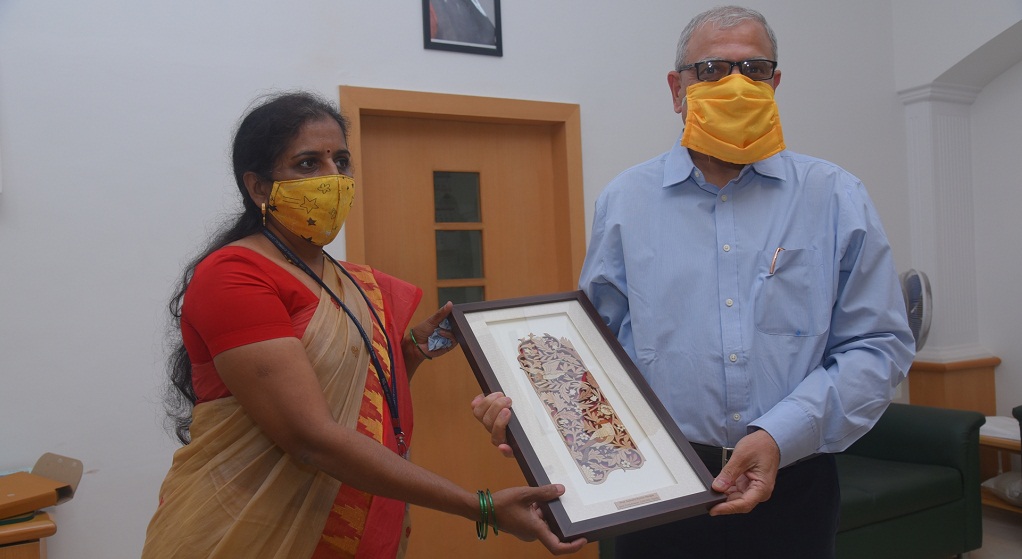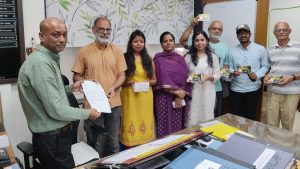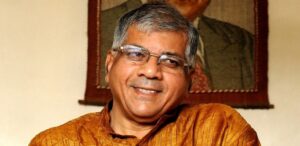Symposium on “Challenges to Opportunities” at CSIR-NCL

Pune, November 11, 2020: CSIR-National Chemical Laboratory (CSIR-NCL), Pune, organized a half-day online virtual symposium on “Challenges to Opportunities” in honour of Prof. Ashwini Kumar Nangia, Director, CSIR-NCL on November 5, 2020. On the occasion, Prof. Nangia was felicitated by the scientists, dignitaries, staff and students in anticipation of his superannuation at the end of this month. He has been leading the laboratory since March 2016.
Dr Ulhas Kharul, Polymer Science & Engineering Division, gave the first talk of the technical session on “Polybenzimidazoles: A promising but ignored membrane material.” He touched upon the role of the general membrane material and its characteristics. These materials can be polymeric, inorganic and metallic which offers selective transportation. They can be converted into films, hollow and tubular fibers. Specific polymers such as Polybenzimidazoles (PBI) have niche properties for different applications. Its structural architecture is tuneable to permeation properties to provide membranes with high thermal stability and low segmental mobility. The high acid uptake is useful for proton exchange membrane preparation and in chemo-dialysis. It has high water sorption which is helpful in natural osmotic phenomenon to be used in commercial applications. Its chemical stability is useful in ultrafiltration, membrane reactor and gas permeation. He talked about different national agendas such as Energy, Environment, Water, Healthcare, and Food where PBI can make a useful impact.
Dr C. V. Ramana, Organic Chemistry Division, presented a talk on the “ORIGIN of INPROTICS.” He gave an overview of the ORIGIN, a project initiated in the twelfth five-year plan. Organic Reactions in Generating Innovative & Natural Scaffolds (ORIGIN) focused on the small molecule libraries in the natural products and pre-validated natural scaffolds and biological mimics. The objective was to design and synthesize small molecules as potential therapeutic agents in human healthcare. His talk also focused on the asymmetric total synthesis of natural products with proven biological activity relevant to cancer CNS arthritis, and cardiovascular disorders. He talked about the ‘Innovative Processes and Technologies for Indian Pharmaceutical and Agrochemical Sector Industries (INPROTICS)’, a project on synthetic routes to pharmaceutical APIs.

Dr Ashok Giri, Biochemical Sciences Division, delivered a talk on a topic “Nature’s Secret Chemistry Protocols Confer Diversity in the Plant Specialized Metabolites.” He said that there are a large size and structural diversity in the plant metabolites. In yeasts more than 550 compounds are found; more than 20,000 compounds are estimated in a single plant; there are about a million metabolites from 270,000 species. He threw light upon the major classes of especial metabolites in plants including terpenoids, alkaloids, phenylpropanoids, and peptides. He emphasized on how and why this diversity was formed in the plants. He referred to it as Nature’s Chemistry protocols. The major highlights were the fruit aromatic compounds and its value and nutrition, steroidal glycoalkaloids from food plants and hazards, cerpegins from some exotic plants which are being explored.
Dr T. G. Ajith Kumar, Physical and Materials Chemistry Division, spoke on “Insights into competitive conformer exchange reactions in pharmaceutical cocrystal using 1H Solid-state NMR.” His talk was focused on the pharmaceutical cocrystals used to manipulate the properties of the drug molecule by altering the Physico-chemical properties. Cocrystallization involves the supramolecular aggregation of two or more different chemical entities in a crystalline lattice through non-covalent interactions. It results in the formation of the cocrystal, eutectic, solid solutions, and polymorphs. He informed about how the pharmaceutical cocrystals are made with the use of the active pharmaceutical components.
Dr T. Raja, Catalysis Division, presented a talk on “The Dimethyl Ether (DME) process technology.” He shared his views on the need for the primary energy requirement for our nation. He said that DME is one of the most promising second-generation alternative fuel solutions. It is ultra-clean, green, and low-carbon emitting fuels under consideration worldwide. An innovative, sustainable and most efficient DME process has been developed with the indigenous catalytic systems and reactor design. He underlined the recent trends of LPG consumption in India, becoming the world’s second-largest LPG consumer. The demands are being increased. He said that DME will play a key role to meet the increasing demands in energy and fuel.
Dr Amol Kulkarni, Chemical Engineering and Process Development Division spoke on “The residence time distribution of solids in straight and curved microchannels.” He explained the concept of residence time distribution (RTD) of solids. Every molecule/ fluid element spends different time inside a reactor. The distribution of these times for the stream of fluid leaving the vessel is called the exit age distribution or the residence time distribution. It is essential to understand that while solids are moving somewhere; the fluids can move fast but the solids can’t. The study of RTD of solid particles is crucial to develop a method for its measurement and quantify the effects and explore the methods to model it in the flow of solid particles. He further talked about the RTD curves for different reactors, experimental set-up and surface functionalization of particles.
Earlier, Dr S. S. Joshi, Head, Chemical Engineering and Process Development Division, along with other divisional chairs Dr C. S. Gopinath and Dr B. L. V. Prasad, inaugurated the symposium.
A felicitation ceremony was organized to present the views of several dignitaries including Dr Shekhar Mande (Director General, CSIR and Secretary DSIR), Dr Paul Ratnasamy (Former Director, CSIR-NCL), Dr S. Sivaram (Former Director, CSIR-NCL), Prof. G. D. Yadav (Former Vice-Chancellor, ICT Mumbai), Prof. Uday Maitra (IISc Bengaluru), Dr Srikant Sastry (CrayonData), Mr Ajay Mehta (Director, Deepak Nitrite Ltd.), Prof. Rama Bijapurkar (ICE360°), Dr Ajit Sapre (Reliance Industries Limited and Chairman, NCL Research Council), Dr D. Srinivas (Bhatnagar Fellow, CSIR-NCL), as well as scientists and staff from CSIR-NCL felicitated Prof. Ashwini Kumar Nangia on this occasion.
In his closing remarks, Prof. Nangia thanked the organizers and participants for their warm and gracious words of appreciation. He summarized the last 5 years of his term at CSIR-NCL with focus on (1) Translation of research inventions to innovation products, including masks and swabs for the Covid-19 pandemic, and eco-friendly Ganesh immersion and hollow fiber membrane-based water filtration as societal benefits; (2) Several mission and fast track projects which have demonstrated results for industry such as paracetamol, dimethyl ether, silver nanowires, pendimethalin and hydrogen fuel cell; (3) Setting up new facilities of chemical pilot plant, 3D printing, microscopy, sophisticated instruments and sewage treatment plant.

Follow and Connect With Us on WhatsApp Telegram Facebook Twitter YouTube Instagram Linkedin






